

 使用rtthread移植qboot工程的学习笔记
使用rtthread移植qboot工程的学习笔记
描述
目前还是一个学生,项目不会做,只能写一些学习笔记,没有什么经验(可能一些自己判断的有一定错误,内容仅作为参考),
个人认为一个健全的项目首先就需要一个bootloader,所以就浅浅记录一下自己使用rtthread studio配置qboot和app工程的制作过程.
芯片使用:STM32F407ZG
使用工具:rtthread studio
移植qboot工程过程
1.创建工程
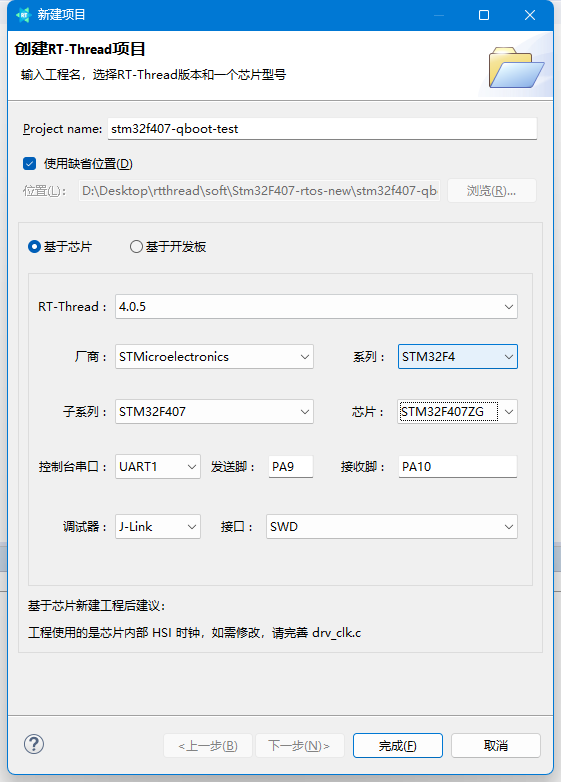 1.1 创建qboot的项目工程
1.1 创建qboot的项目工程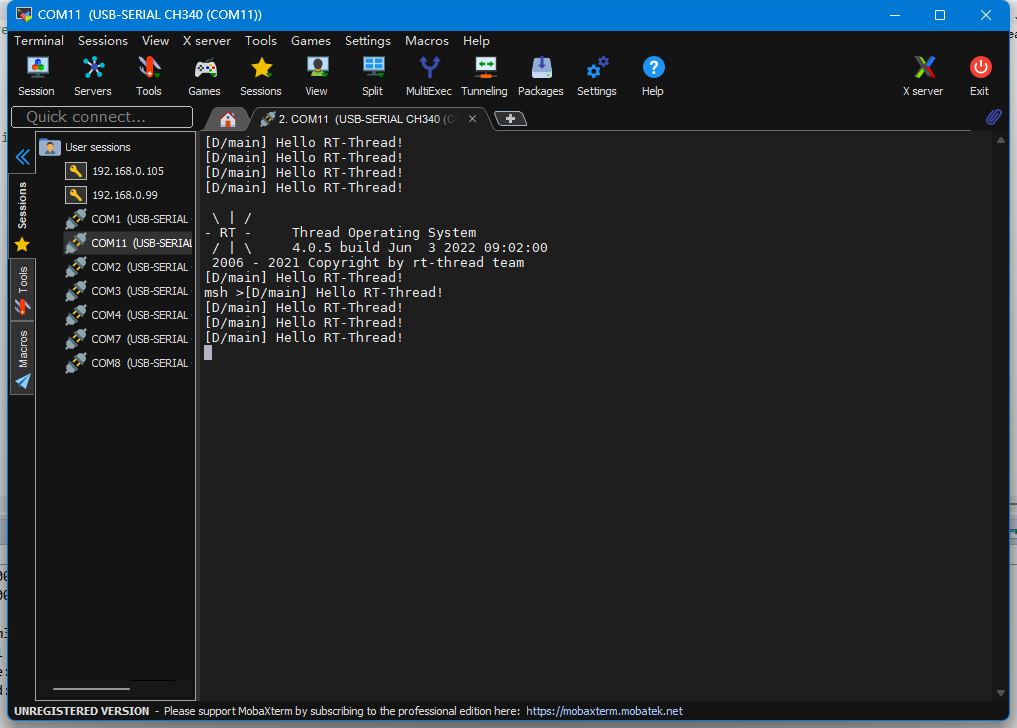 1.2 浅跑一下试试
1.2 浅跑一下试试2.开始配置spi的外部flash – w25q16 (这里使用spi1,可根据具体调整)
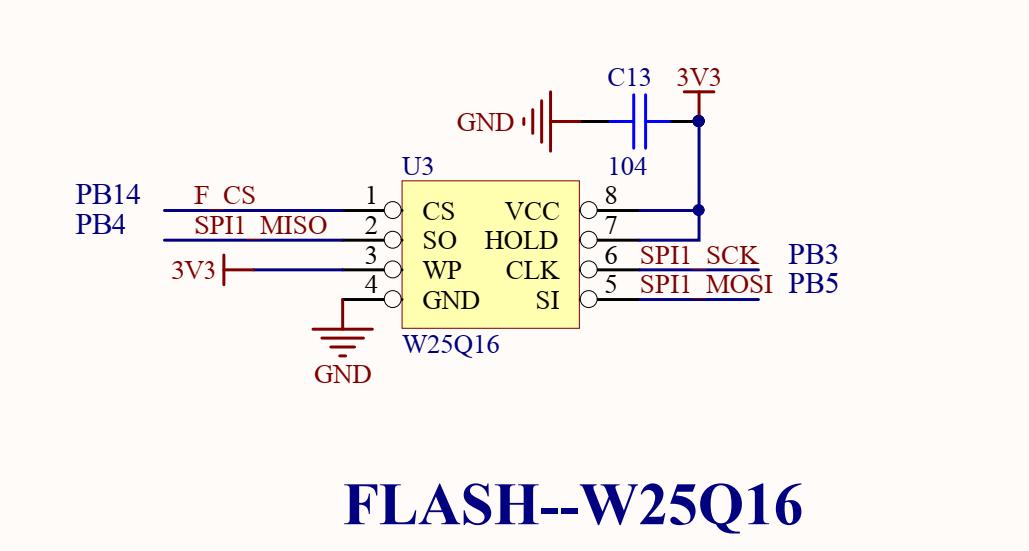 2.1 spi硬件连接
2.1 spi硬件连接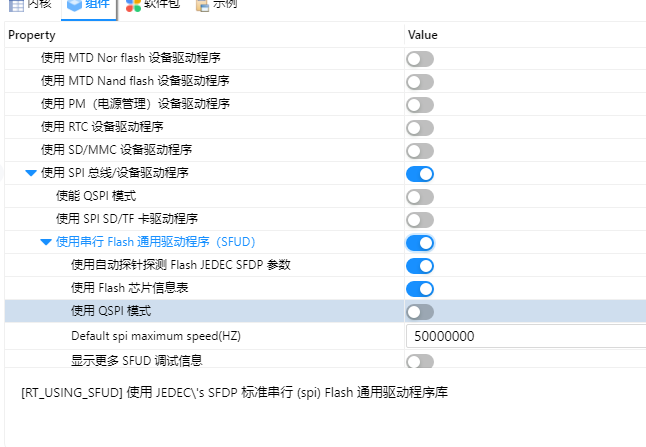 2.2 在rtthread setting内开启spi
2.2 在rtthread setting内开启spi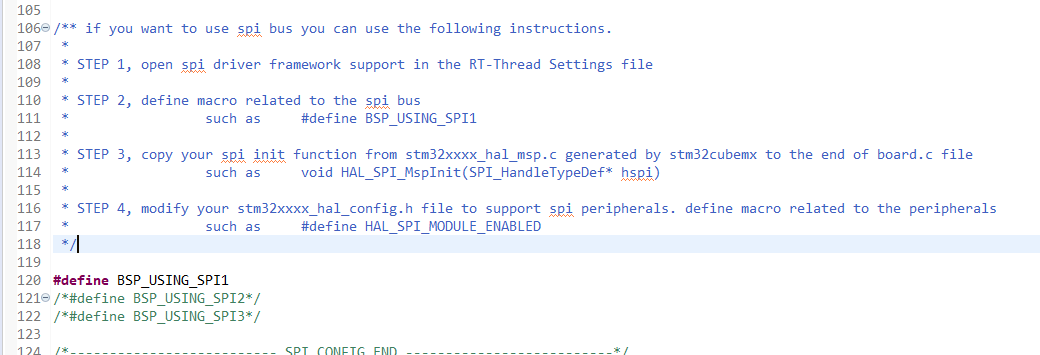 2.3 在board.h内开启使用spi1
2.3 在board.h内开启使用spi1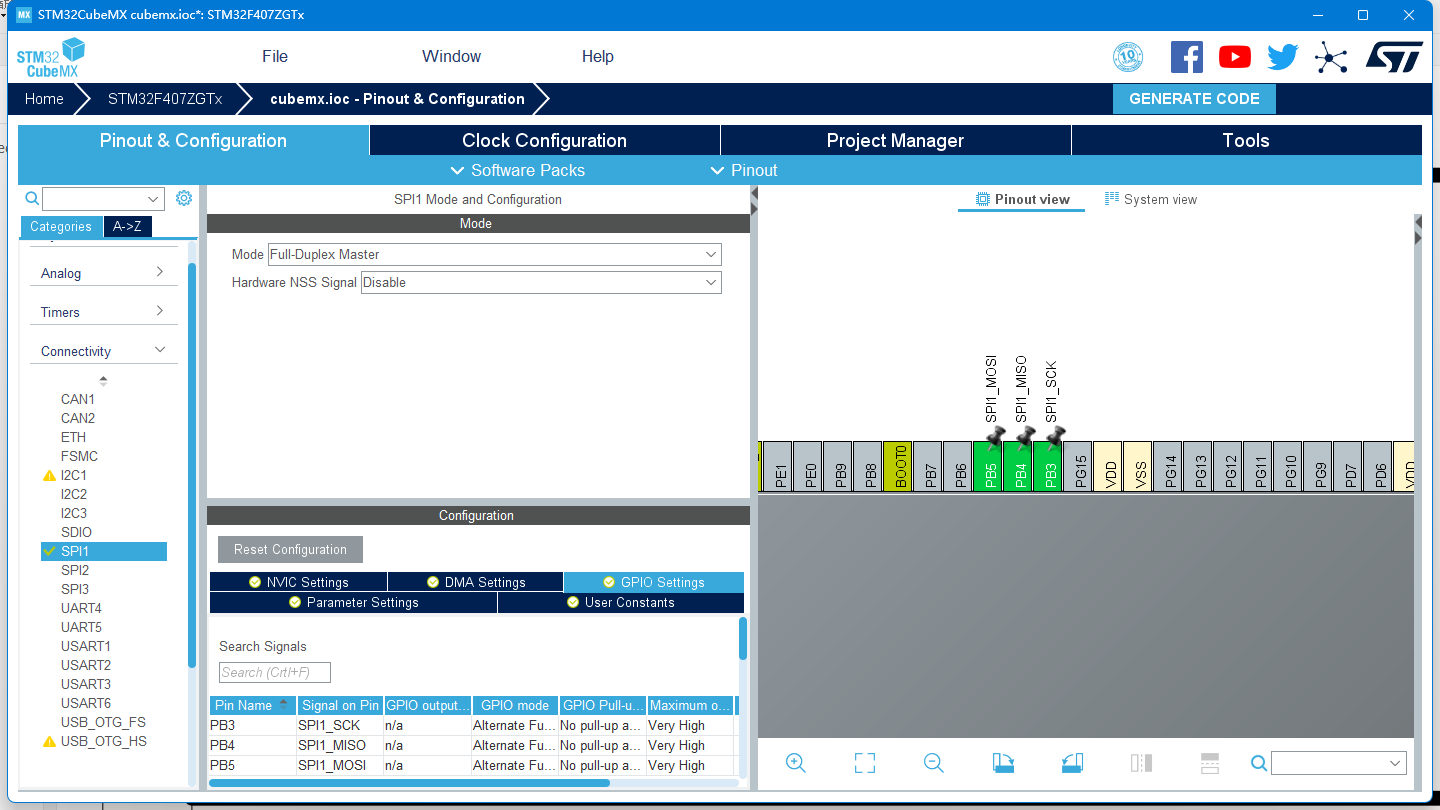 2.4 CubeMX setting内配置spi
2.4 CubeMX setting内配置spi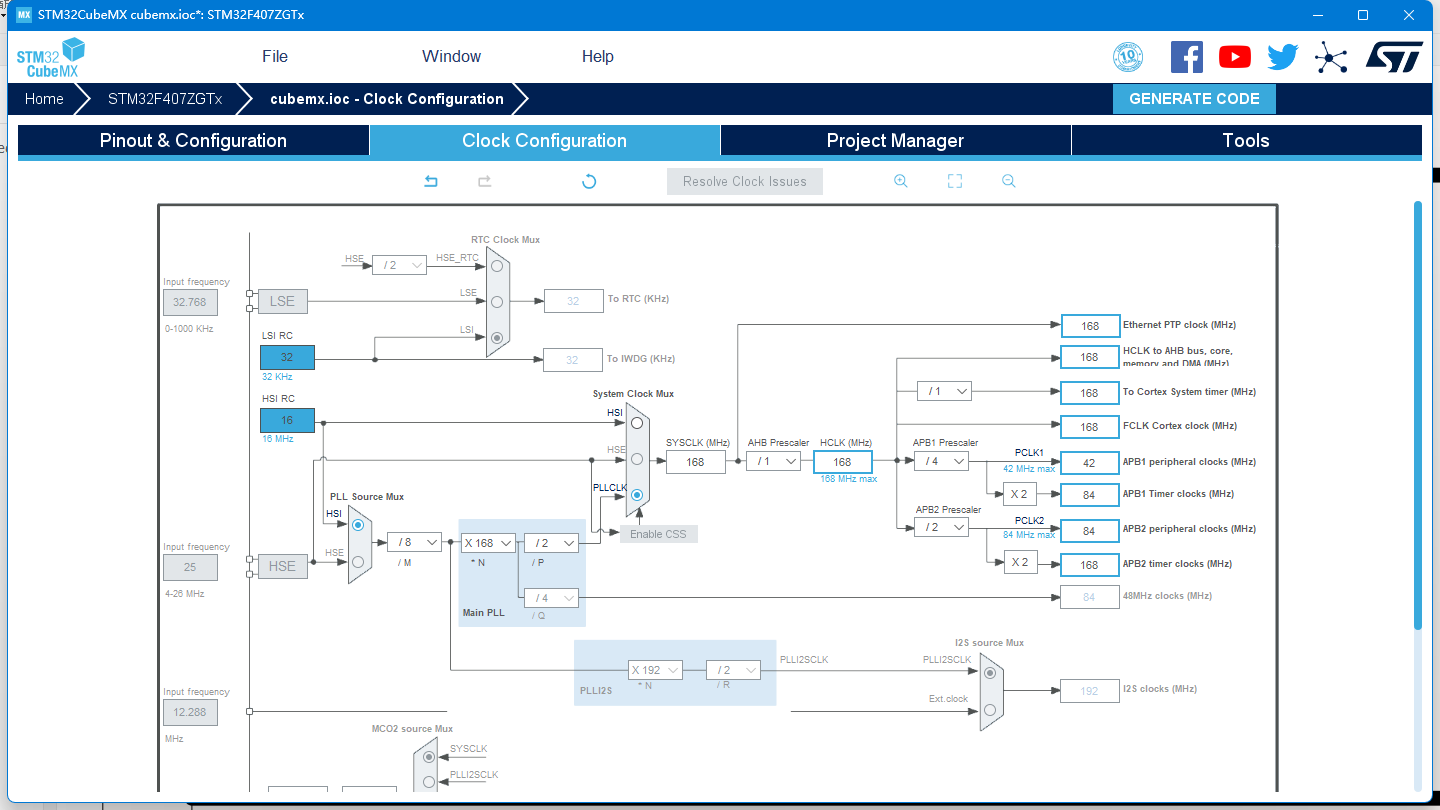 2.5 CubeMX setting内配置芯片时钟
2.5 CubeMX setting内配置芯片时钟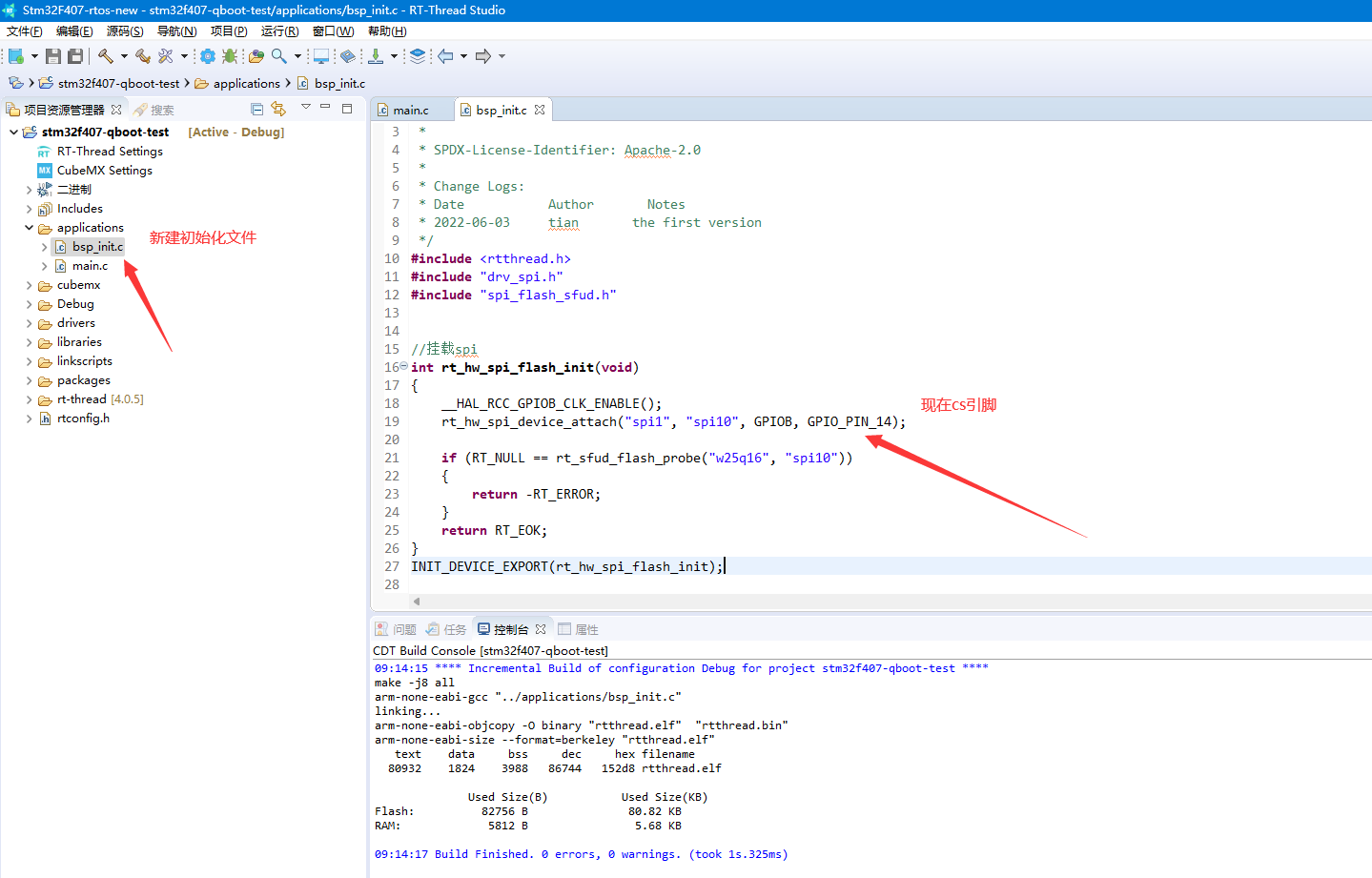 2.6 添加挂载spi的代码
2.6 添加挂载spi的代码
//****************************************
//注意这里括号显示就没了 自己包含一下头文件
//****************************************
//这里添加 rtthread.h
//加上 大于小于括号
#include
#include "drv_spi.h"
#include "spi_flash_sfud.h"
//挂载spi
int rt_hw_spi_flash_init(void)
{
__HAL_RCC_GPIOB_CLK_ENABLE(); //片选引脚为PB14
rt_hw_spi_device_attach("spi1", "spi10", GPIOB, GPIO_PIN_14); //片选引脚为PB14
if (RT_NULL == rt_sfud_flash_probe("w25q16", "spi10"))
{
return -RT_ERROR;
}
return RT_EOK;
}
INIT_DEVICE_EXPORT(rt_hw_spi_flash_init);
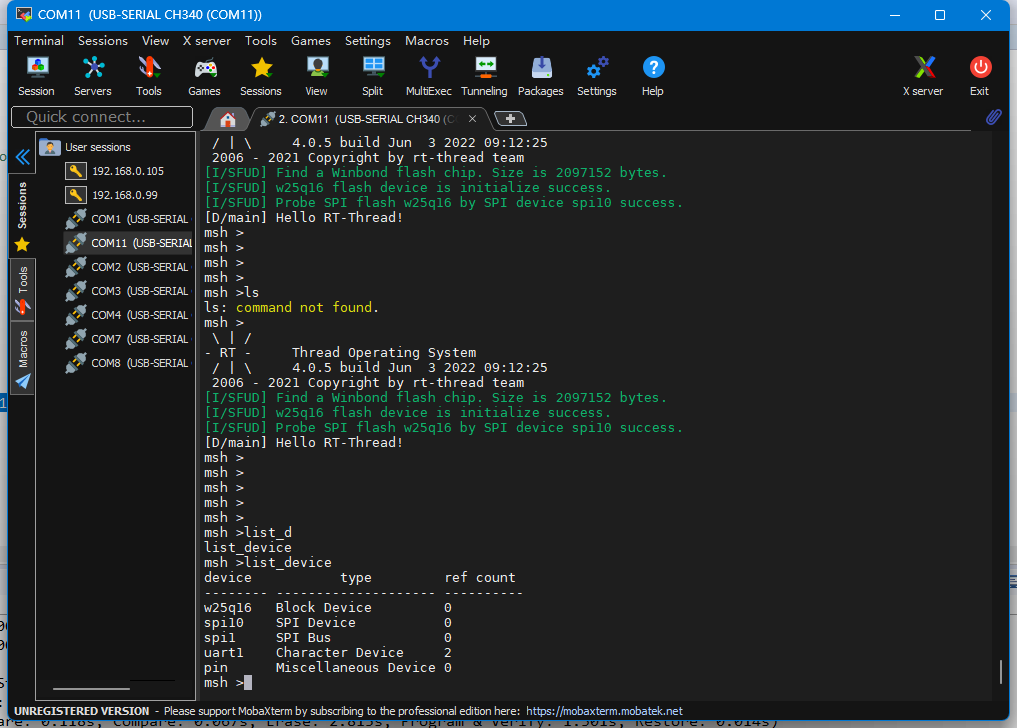 2.7 成功创建spi和w25q16
2.7 成功创建spi和w25q163.使用fal设置分区
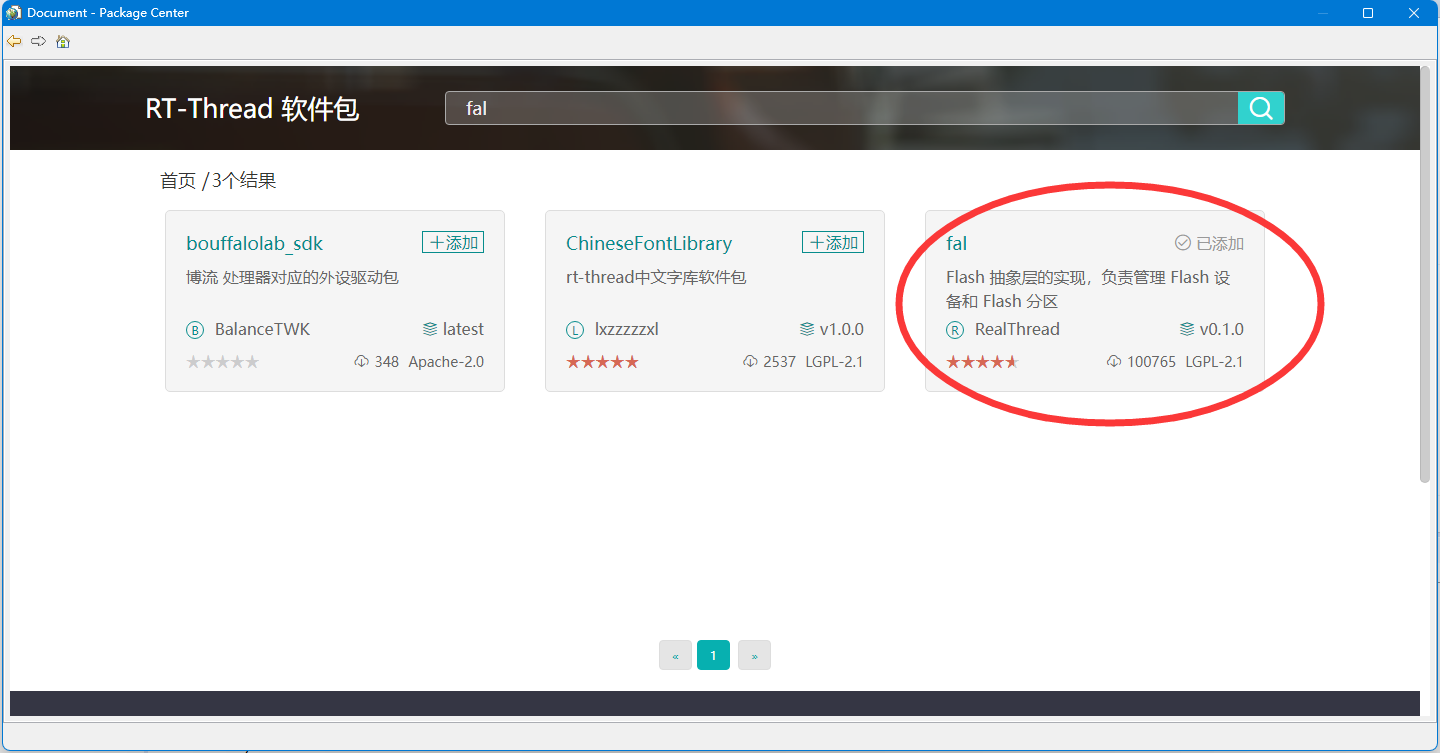 3.1 添加软件包
3.1 添加软件包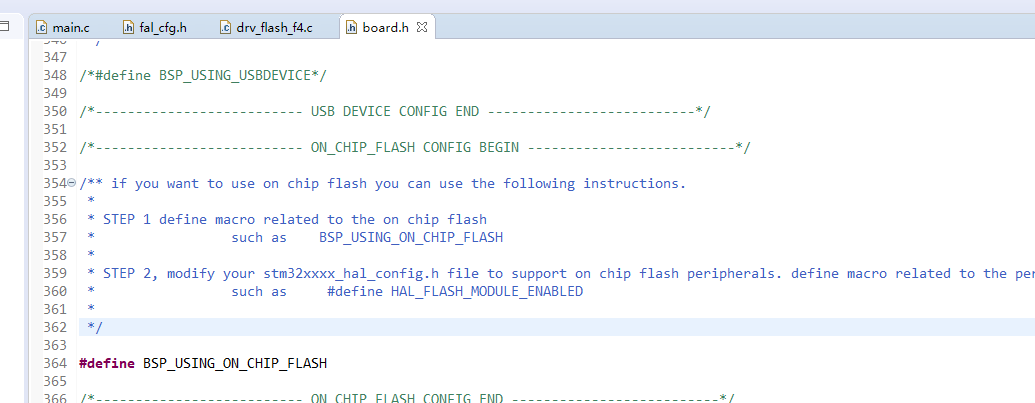 3.2 board.h 里定义
3.2 board.h 里定义 define BSP_USING_ON_CHIP_FLASH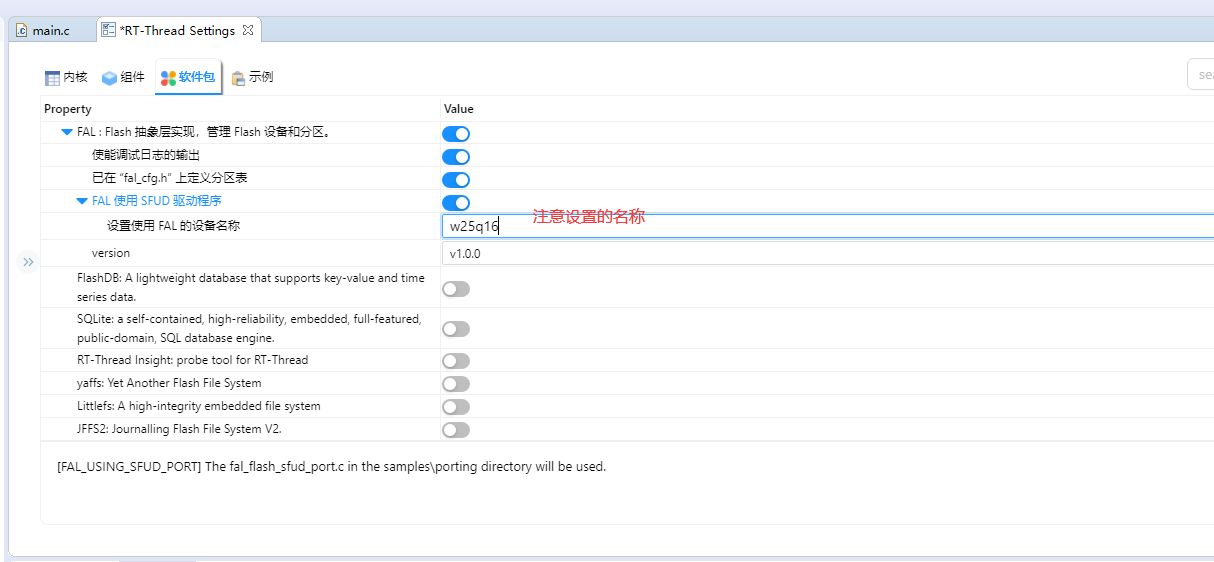 3.3 配置Fal
3.3 配置Fal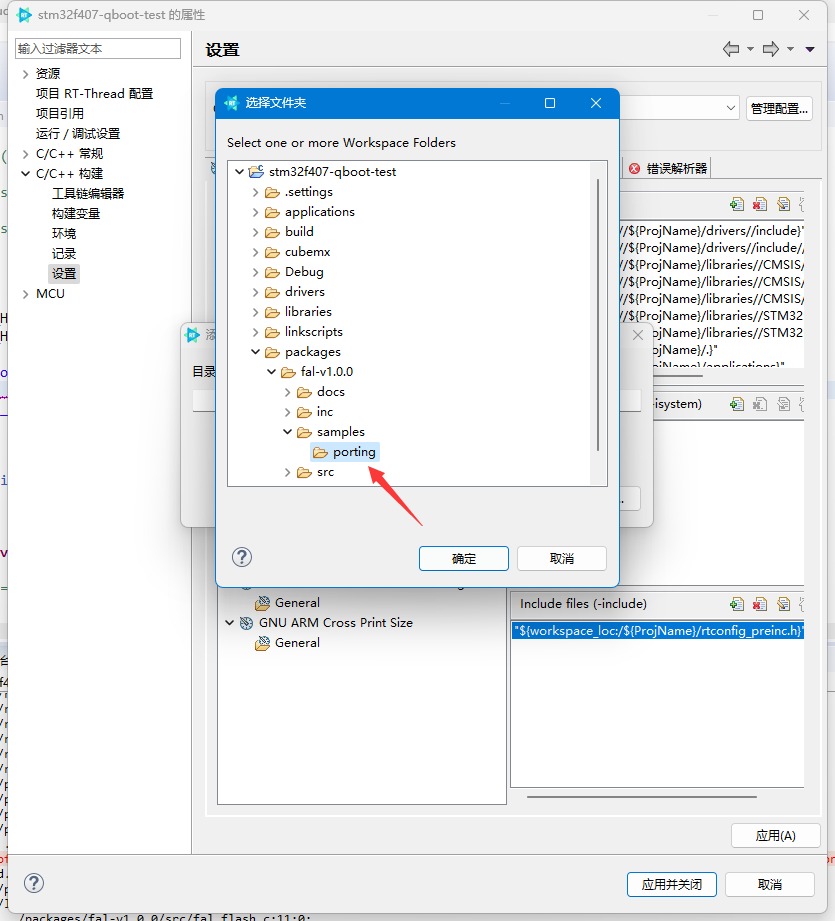 3.4 添加路径 因为运行提示找不到fal_cfg.h的路径
3.4 添加路径 因为运行提示找不到fal_cfg.h的路径在此处运行后,会发现如下错误:(在这个地方有较多的解决方法,但是有的方法在到后面在使用后续的ota升级的时候,会擦除到app区域,具体我也不懂…….)
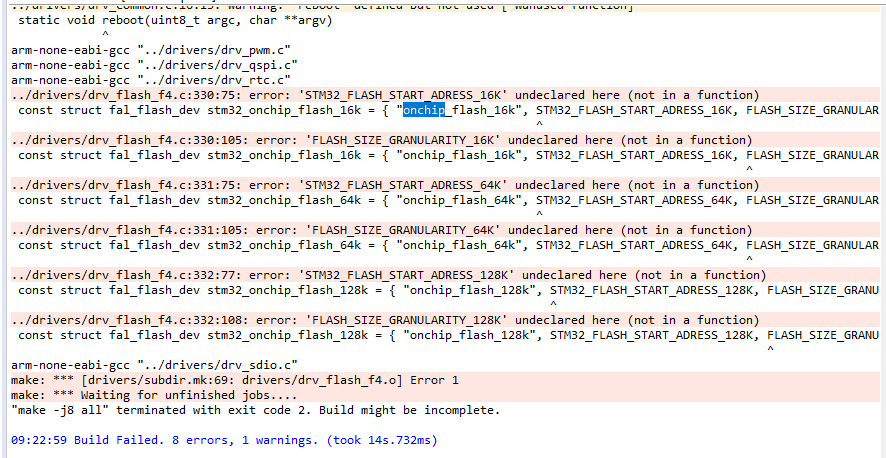 3.5 出现错误
3.5 出现错误解决方法:(将如下代码 全部替换 到 drv_flash_f4.c 文件)
/*
* Copyright (c) 2006-2018, RT-Thread Development Team
*
* SPDX-License-Identifier: Apache-2.0
*
* Change Logs:
* Date Author Notes
*/
#include "board.h"
#ifdef BSP_USING_ON_CHIP_FLASH
#include "drv_config.h"
#include "drv_flash.h"
#if defined(PKG_USING_FAL)
#include "fal.h"
#endif
//#define DRV_DEBUG
#define LOG_TAG "drv.flash"
#include
/* Base address of the Flash sectors Bank 1 */
#define ADDR_FLASH_SECTOR_0 ((uint32_t)0x08000000) /* Base @ of Sector 0, 16 Kbytes */
#define ADDR_FLASH_SECTOR_1 ((uint32_t)0x08004000) /* Base @ of Sector 1, 16 Kbytes */
#define ADDR_FLASH_SECTOR_2 ((uint32_t)0x08008000) /* Base @ of Sector 2, 16 Kbytes */
#define ADDR_FLASH_SECTOR_3 ((uint32_t)0x0800C000) /* Base @ of Sector 3, 16 Kbytes */
#define ADDR_FLASH_SECTOR_4 ((uint32_t)0x08010000) /* Base @ of Sector 4, 64 Kbytes */
#define ADDR_FLASH_SECTOR_5 ((uint32_t)0x08020000) /* Base @ of Sector 5, 128 Kbytes */
#define ADDR_FLASH_SECTOR_6 ((uint32_t)0x08040000) /* Base @ of Sector 6, 128 Kbytes */
#define ADDR_FLASH_SECTOR_7 ((uint32_t)0x08060000) /* Base @ of Sector 7, 128 Kbytes */
#define ADDR_FLASH_SECTOR_8 ((uint32_t)0x08080000) /* Base @ of Sector 8, 128 Kbytes */
#define ADDR_FLASH_SECTOR_9 ((uint32_t)0x080A0000) /* Base @ of Sector 9, 128 Kbytes */
#define ADDR_FLASH_SECTOR_10 ((uint32_t)0x080C0000) /* Base @ of Sector 10, 128 Kbytes */
#define ADDR_FLASH_SECTOR_11 ((uint32_t)0x080E0000) /* Base @ of Sector 11, 128 Kbytes */
/* Base address of the Flash sectors Bank 2 */
#define ADDR_FLASH_SECTOR_12 ((uint32_t)0x08100000) /* Base @ of Sector 0, 16 Kbytes */
#define ADDR_FLASH_SECTOR_13 ((uint32_t)0x08104000) /* Base @ of Sector 1, 16 Kbytes */
#define ADDR_FLASH_SECTOR_14 ((uint32_t)0x08108000) /* Base @ of Sector 2, 16 Kbytes */
#define ADDR_FLASH_SECTOR_15 ((uint32_t)0x0810C000) /* Base @ of Sector 3, 16 Kbytes */
#define ADDR_FLASH_SECTOR_16 ((uint32_t)0x08110000) /* Base @ of Sector 4, 64 Kbytes */
#define ADDR_FLASH_SECTOR_17 ((uint32_t)0x08120000) /* Base @ of Sector 5, 128 Kbytes */
#define ADDR_FLASH_SECTOR_18 ((uint32_t)0x08140000) /* Base @ of Sector 6, 128 Kbytes */
#define ADDR_FLASH_SECTOR_19 ((uint32_t)0x08160000) /* Base @ of Sector 7, 128 Kbytes */
#define ADDR_FLASH_SECTOR_20 ((uint32_t)0x08180000) /* Base @ of Sector 8, 128 Kbytes */
#define ADDR_FLASH_SECTOR_21 ((uint32_t)0x081A0000) /* Base @ of Sector 9, 128 Kbytes */
#define ADDR_FLASH_SECTOR_22 ((uint32_t)0x081C0000) /* Base @ of Sector 10, 128 Kbytes */
#define ADDR_FLASH_SECTOR_23 ((uint32_t)0x081E0000) /* Base @ of Sector 11, 128 Kbytes */
/**
* @brief Gets the sector of a given address
* @param None
* @retval The sector of a given address
*/
static rt_uint32_t GetSector(rt_uint32_t Address)
{
rt_uint32_t sector = 0;
if((Address < ADDR_FLASH_SECTOR_1) && (Address >= ADDR_FLASH_SECTOR_0))
{
sector = FLASH_SECTOR_0;
}
else if((Address < ADDR_FLASH_SECTOR_2) && (Address >= ADDR_FLASH_SECTOR_1))
{
sector = FLASH_SECTOR_1;
}
else if((Address < ADDR_FLASH_SECTOR_3) && (Address >= ADDR_FLASH_SECTOR_2))
{
sector = FLASH_SECTOR_2;
}
else if((Address < ADDR_FLASH_SECTOR_4) && (Address >= ADDR_FLASH_SECTOR_3))
{
sector = FLASH_SECTOR_3;
}
else if((Address < ADDR_FLASH_SECTOR_5) && (Address >= ADDR_FLASH_SECTOR_4))
{
sector = FLASH_SECTOR_4;
}
else if((Address < ADDR_FLASH_SECTOR_6) && (Address >= ADDR_FLASH_SECTOR_5))
{
sector = FLASH_SECTOR_5;
}
else if((Address < ADDR_FLASH_SECTOR_7) && (Address >= ADDR_FLASH_SECTOR_6))
{
sector = FLASH_SECTOR_6;
}
else if((Address < ADDR_FLASH_SECTOR_8) && (Address >= ADDR_FLASH_SECTOR_7))
{
sector = FLASH_SECTOR_7;
}
#if defined(FLASH_SECTOR_8)
else if((Address < ADDR_FLASH_SECTOR_9) && (Address >= ADDR_FLASH_SECTOR_8))
{
sector = FLASH_SECTOR_8;
}
#endif
#if defined(FLASH_SECTOR_9)
else if((Address < ADDR_FLASH_SECTOR_10) && (Address >= ADDR_FLASH_SECTOR_9))
{
sector = FLASH_SECTOR_9;
}
#endif
#if defined(FLASH_SECTOR_10)
else if((Address < ADDR_FLASH_SECTOR_11) && (Address >= ADDR_FLASH_SECTOR_10))
{
sector = FLASH_SECTOR_10;
}
#endif
#if defined(FLASH_SECTOR_11)
else if((Address < ADDR_FLASH_SECTOR_12) && (Address >= ADDR_FLASH_SECTOR_11))
{
sector = FLASH_SECTOR_11;
}
#endif
#if defined(STM32F427xx) || defined(STM32F437xx) || defined(STM32F429xx)|| defined(STM32F439xx) || defined(STM32F469xx) || defined(STM32F479xx)
else if((Address < ADDR_FLASH_SECTOR_13) && (Address >= ADDR_FLASH_SECTOR_12))
{
sector = FLASH_SECTOR_12;
}
else if((Address < ADDR_FLASH_SECTOR_14) && (Address >= ADDR_FLASH_SECTOR_13))
{
sector = FLASH_SECTOR_13;
}
else if((Address < ADDR_FLASH_SECTOR_15) && (Address >= ADDR_FLASH_SECTOR_14))
{
sector = FLASH_SECTOR_14;
}
else if((Address < ADDR_FLASH_SECTOR_16) && (Address >= ADDR_FLASH_SECTOR_15))
{
sector = FLASH_SECTOR_15;
}
else if((Address < ADDR_FLASH_SECTOR_17) && (Address >= ADDR_FLASH_SECTOR_16))
{
sector = FLASH_SECTOR_16;
}
else if((Address < ADDR_FLASH_SECTOR_18) && (Address >= ADDR_FLASH_SECTOR_17))
{
sector = FLASH_SECTOR_17;
}
else if((Address < ADDR_FLASH_SECTOR_19) && (Address >= ADDR_FLASH_SECTOR_18))
{
sector = FLASH_SECTOR_18;
}
else if((Address < ADDR_FLASH_SECTOR_20) && (Address >= ADDR_FLASH_SECTOR_19))
{
sector = FLASH_SECTOR_19;
}
else if((Address < ADDR_FLASH_SECTOR_21) && (Address >= ADDR_FLASH_SECTOR_20))
{
sector = FLASH_SECTOR_20;
}
else if((Address < ADDR_FLASH_SECTOR_22) && (Address >= ADDR_FLASH_SECTOR_21))
{
sector = FLASH_SECTOR_21;
}
else if((Address < ADDR_FLASH_SECTOR_23) && (Address >= ADDR_FLASH_SECTOR_22))
{
sector = FLASH_SECTOR_22;
}
else /* (Address < FLASH_END_ADDR) && (Address >= ADDR_FLASH_SECTOR_23) */
{
sector = FLASH_SECTOR_23;
}
#endif
return sector;
}
/**
* Read data from flash.
* @note This operation's units is word.
*
* @param addr flash address
* @param buf buffer to store read data
* @param size read bytes size
*
* @return result
*/
int stm32_flash_read(rt_uint32_t addr, rt_uint8_t *buf, size_t size)
{
size_t i;
if ((addr + size) > STM32_FLASH_END_ADDRESS)
{
LOG_E("read outrange flash size! addr is (0x%p)", (void*)(addr + size));
return -1;
}
for (i = 0; i < size; i++, buf++, addr++)
{
*buf = *(rt_uint8_t *) addr;
}
return size;
}
/**
* Write data to flash.
* @note This operation's units is word.
* @note This operation must after erase. @see flash_erase.
*
* @param addr flash address
* @param buf the write data buffer
* @param size write bytes size
*
* @return result
*/
int stm32_flash_write(rt_uint32_t addr, const rt_uint8_t *buf, size_t size)
{
rt_err_t result = RT_EOK;
rt_uint32_t end_addr = addr + size;
if ((end_addr) > STM32_FLASH_END_ADDRESS)
{
LOG_E("write outrange flash size! addr is (0x%p)", (void*)(addr + size));
return -RT_EINVAL;
}
if (size < 1)
{
return -RT_EINVAL;
}
HAL_FLASH_Unlock();
__HAL_FLASH_CLEAR_FLAG(FLASH_FLAG_EOP | FLASH_FLAG_OPERR | FLASH_FLAG_WRPERR | FLASH_FLAG_PGAERR | FLASH_FLAG_PGPERR | FLASH_FLAG_PGSERR);
for (size_t i = 0; i < size; i++, addr++, buf++)
{
/* write data to flash */
if (HAL_FLASH_Program(FLASH_TYPEPROGRAM_BYTE, addr, (rt_uint64_t)(*buf)) == HAL_OK)
{
if (*(rt_uint8_t *)addr != *buf)
{
result = -RT_ERROR;
break;
}
}
else
{
result = -RT_ERROR;
break;
}
}
HAL_FLASH_Lock();
if (result != RT_EOK)
{
return result;
}
return size;
}
/**
* Erase data on flash.
* @note This operation is irreversible.
* @note This operation's units is different which on many chips.
*
* @param addr flash address
* @param size erase bytes size
*
* @return result
*/
int stm32_flash_erase(rt_uint32_t addr, size_t size)
{
rt_err_t result = RT_EOK;
rt_uint32_t FirstSector = 0, NbOfSectors = 0;
rt_uint32_t SECTORError = 0;
if ((addr + size) > STM32_FLASH_END_ADDRESS)
{
LOG_E("ERROR: erase outrange flash size! addr is (0x%p)\n", (void*)(addr + size));
return -RT_EINVAL;
}
/*Variable used for Erase procedure*/
FLASH_EraseInitTypeDef EraseInitStruct;
/* Unlock the Flash to enable the flash control register access */
HAL_FLASH_Unlock();
__HAL_FLASH_CLEAR_FLAG(FLASH_FLAG_EOP | FLASH_FLAG_OPERR | FLASH_FLAG_WRPERR | FLASH_FLAG_PGAERR | FLASH_FLAG_PGPERR | FLASH_FLAG_PGSERR);
/* Get the 1st sector to erase */
FirstSector = GetSector(addr);
/* Get the number of sector to erase from 1st sector*/
NbOfSectors = GetSector(addr + size - 1) - FirstSector + 1;
/* Fill EraseInit structure*/
EraseInitStruct.TypeErase = FLASH_TYPEERASE_SECTORS;
EraseInitStruct.VoltageRange = FLASH_VOLTAGE_RANGE_3;
EraseInitStruct.Sector = FirstSector;
EraseInitStruct.NbSectors = NbOfSectors;
if (HAL_FLASHEx_Erase(&EraseInitStruct, (uint32_t *)&SECTORError) != HAL_OK)
{
result = -RT_ERROR;
goto __exit;
}
__exit:
HAL_FLASH_Lock();
if (result != RT_EOK)
{
return result;
}
LOG_D("erase done: addr (0x%p), size %d", (void*)addr, size);
return size;
}
#if defined(PKG_USING_FAL)
static int fal_flash_read(long offset, rt_uint8_t *buf, size_t size);
static int fal_flash_write(long offset, const rt_uint8_t *buf, size_t size);
static int fal_flash_erase(long offset, size_t size);
const struct fal_flash_dev stm32_onchip_flash = { "onchip_flash", STM32_FLASH_START_ADRESS, STM32_FLASH_SIZE, 0x800U, {NULL, fal_flash_read, fal_flash_write, fal_flash_erase} };
static int fal_flash_read(long offset, rt_uint8_t *buf, size_t size)
{
return stm32_flash_read(stm32_onchip_flash.addr + offset, buf, size);
}
static int fal_flash_write(long offset, const rt_uint8_t *buf, size_t size)
{
return stm32_flash_write(stm32_onchip_flash.addr + offset, buf, size);
}
static int fal_flash_erase(long offset, size_t size)
{
return stm32_flash_erase(stm32_onchip_flash.addr + offset, size);
}
#endif
#endif /* BSP_USING_ON_CHIP_FLASH */
再修改 fal_cfg.h 文件设置自己的分区设置(分区根据实际情况设置)
/*
* Copyright (c) 2006-2018, RT-Thread Development Team
*
* SPDX-License-Identifier: Apache-2.0
*
* Change Logs:
* Date Author Notes
*/
#ifndef _FAL_CFG_H_
#define _FAL_CFG_H_
//****************************************
//注意这里括号显示就没了 自己包含一下头文件
//****************************************
//加上 大于小于括号
#include rtconfig.h
#include board.h
#define NOR_FLASH_DEV_NAME "w25q16"
/* ===================== Flash device Configuration ========================= */
extern const struct fal_flash_dev stm32_onchip_flash;
/* ===================== Flash device Configuration ========================= */
extern struct fal_flash_dev nor_flash0;
/* flash device table */
#define FAL_FLASH_DEV_TABLE \
{ \
&stm32_onchip_flash, \
&nor_flash0, \
}
/* ====================== Partition Configuration ========================== */
#ifdef FAL_PART_HAS_TABLE_CFG
/* partition table */
#define FAL_PART_TABLE \
{ \
/* name dev 开始地址 大小 0 */ \
{FAL_PART_MAGIC_WORD, "qboot", "onchip_flash", 0, 128*1024, 0}, \
{FAL_PART_MAGIC_WORD, "app", "onchip_flash", 128*1024, 445*1024, 0}, \
{FAL_PART_MAGIC_WORD, "factory", "onchip_flash", (128+448)*1024, 445*1024, 0}, \
{FAL_PART_MAGIC_WORD, "filesystem", NOR_FLASH_DEV_NAME, 0, 1020*1024, 0}, \
{FAL_PART_MAGIC_WORD, "download", NOR_FLASH_DEV_NAME, 1024*1024, 510*1024, 0}, \
{FAL_PART_MAGIC_WORD, "easyflash", NOR_FLASH_DEV_NAME, (1024+512)*1024, 510*1024, 0}, \
}
#endif /* FAL_PART_HAS_TABLE_CFG */
#endif /* _FAL_CFG_H_ */
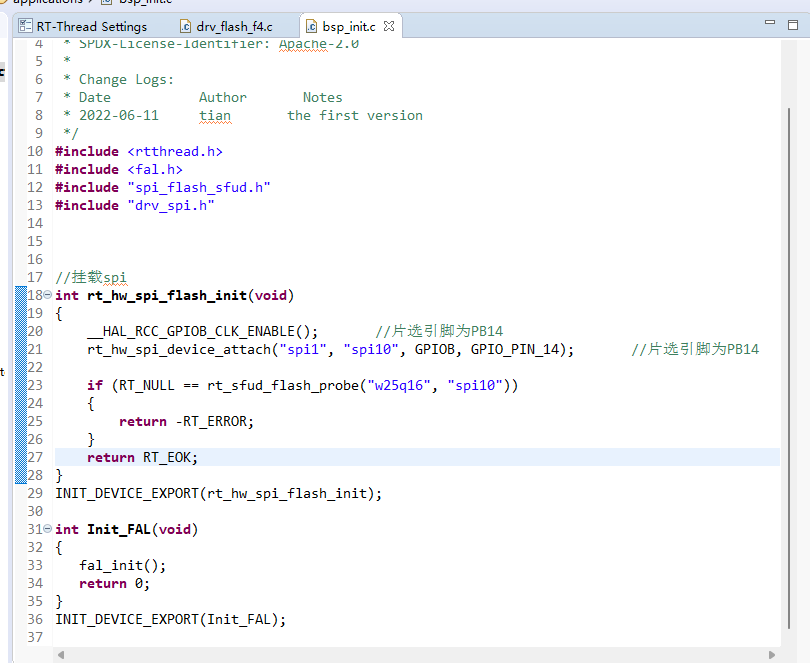 3.6 初始化工作
3.6 初始化工作
//****************************************
//注意这里括号显示就没了 自己包含一下头文件
//****************************************
//这里添加 fal.h rtthread.h
//加上 大于小于括号
#include
#include
#include "drv_spi.h"
#include "spi_flash_sfud.h"
//注意fal的初始化要在外部flash初始化之后
int Init_FAL(void)
{
fal_init();
return 0;
}
INIT_DEVICE_EXPORT(Init_FAL);
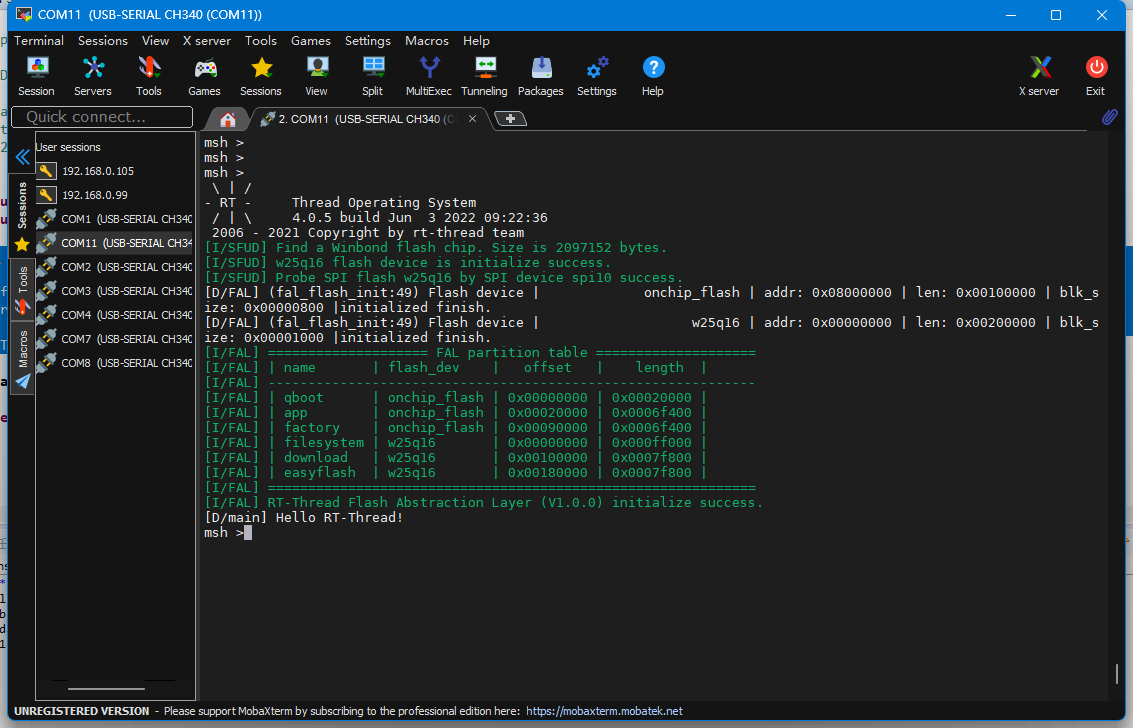 3.7 可以看见分区已经成功了
3.7 可以看见分区已经成功了4.开始添加qboot
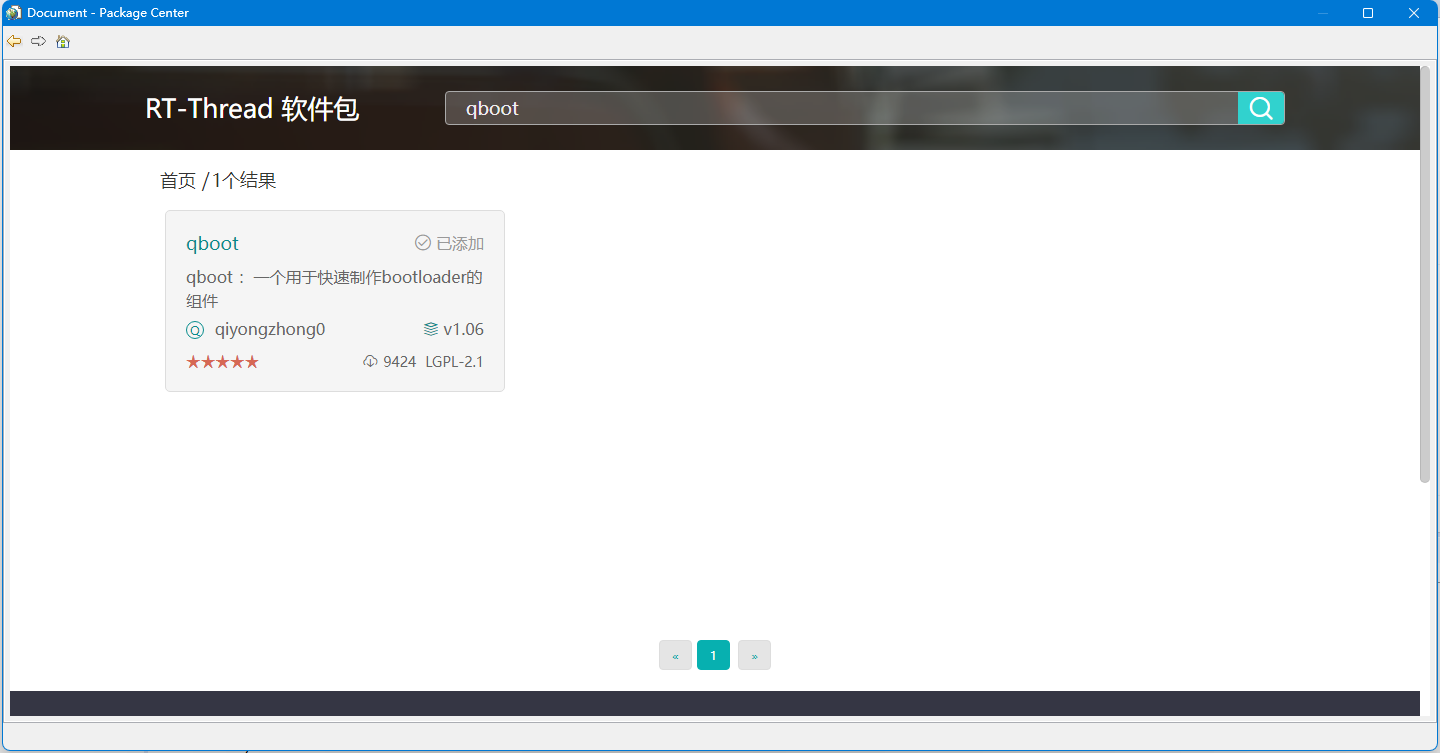 4.1 添加qboot
4.1 添加qboot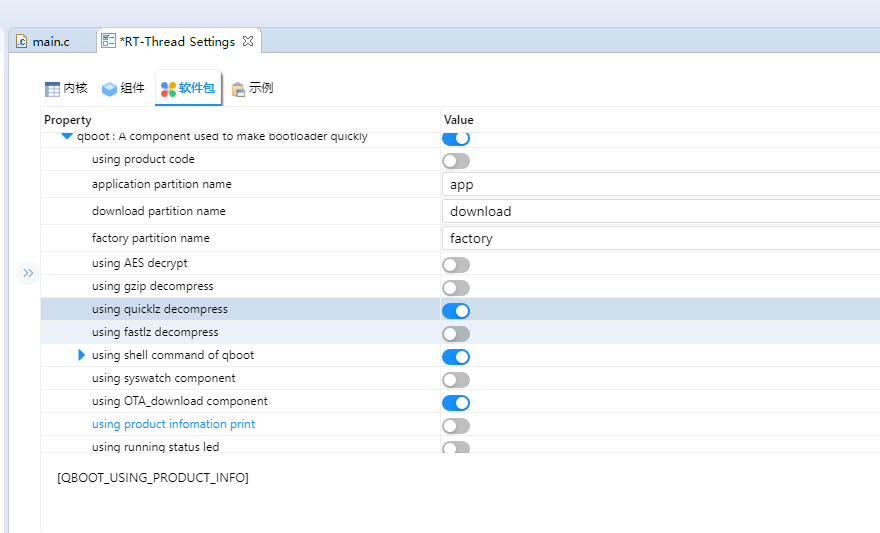 4.2 配置qboot 把没用上的都关了
4.2 配置qboot 把没用上的都关了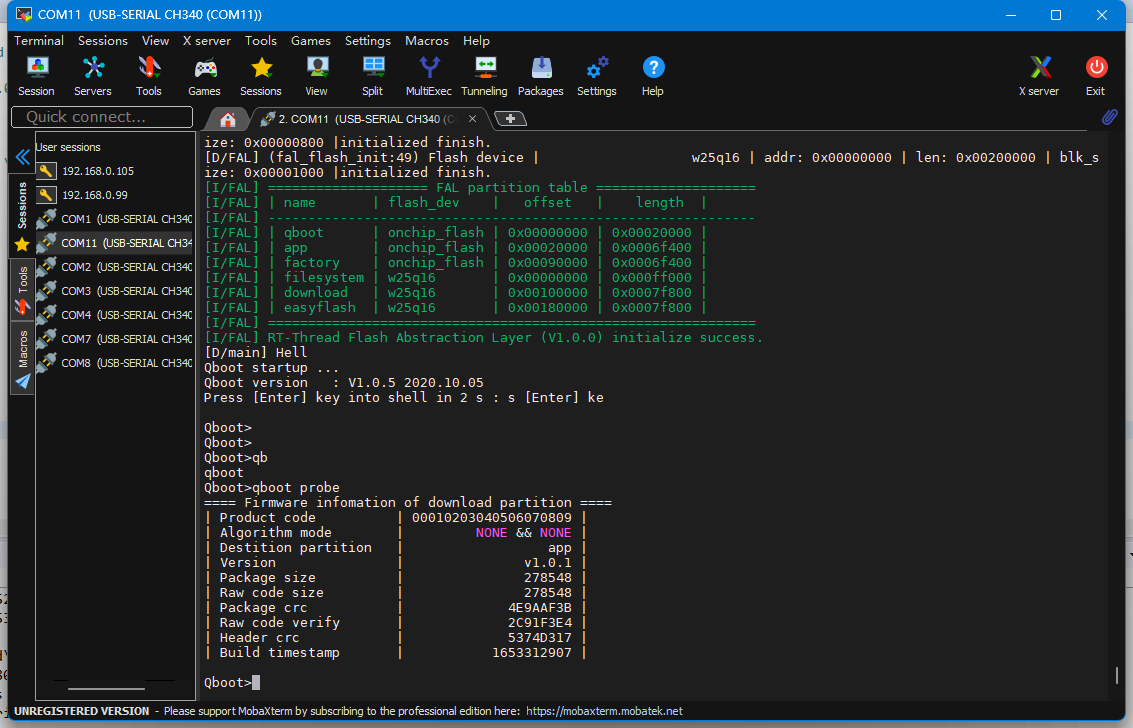 4.3 qboot运行成功(上面打印问题把main函数里面打印去掉就好了)
4.3 qboot运行成功(上面打印问题把main函数里面打印去掉就好了)移植app工程过程
1.创建工程在main中添加如下
#include "stm32f4xx_hal.h"
/*app partition begin address*/
//app分区的地址
#define RT_APP_PART_ADDR 0x08020000
static int ota_app_vtor_reconfig(void)
{
#define NVIC_VTOR_MASK 0x3FFFFF80
/* Set the Vector Table base location by user application firmware definition */
SCB->VTOR = RT_APP_PART_ADDR & NVIC_VTOR_MASK;
return 0;
}
INIT_BOARD_EXPORT(ota_app_vtor_reconfig);
int F4_clock_information(void)
{
LOG_I("System Clock information");
LOG_I("SYSCLK_Frequency = %d", HAL_RCC_GetSysClockFreq());
LOG_I("HCLK_Frequency = %d", HAL_RCC_GetHCLKFreq());
LOG_I("PCLK1_Frequency = %d", HAL_RCC_GetPCLK1Freq());
LOG_I("PCLK2_Frequency = %d", HAL_RCC_GetPCLK2Freq());
return RT_EOK;
}
INIT_DEVICE_EXPORT(F4_clock_information);
2.修改 \linkscripts\STM32F407ZG\link.lds 内的起始地址
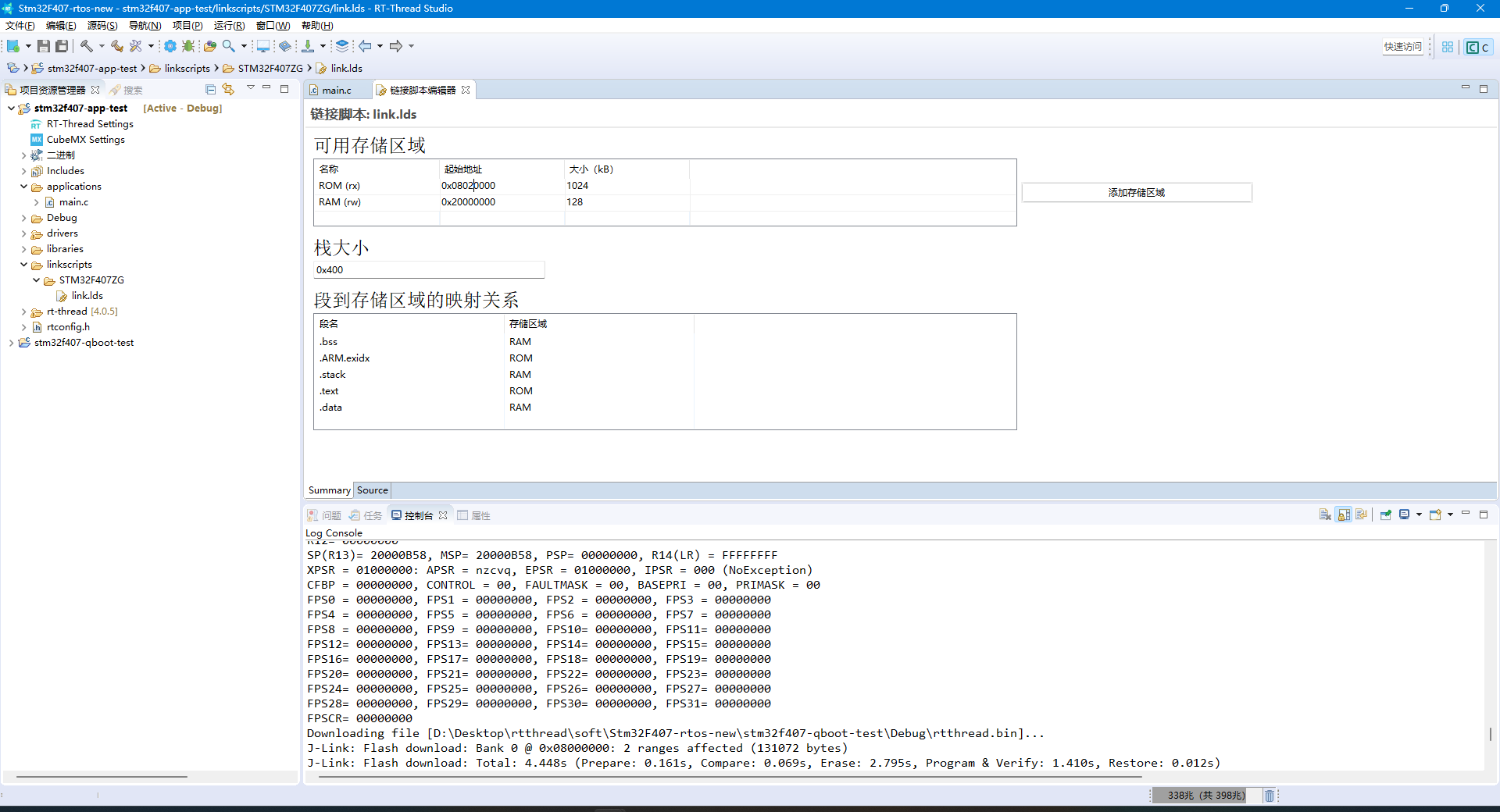
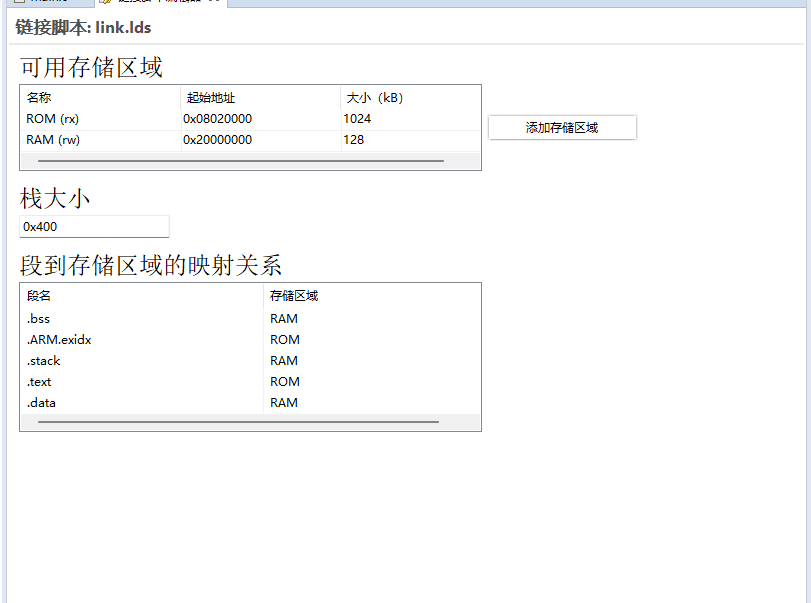 2.1 将0x08000000改为你的app分区的地址
2.1 将0x08000000改为你的app分区的地址3.成功运行结果
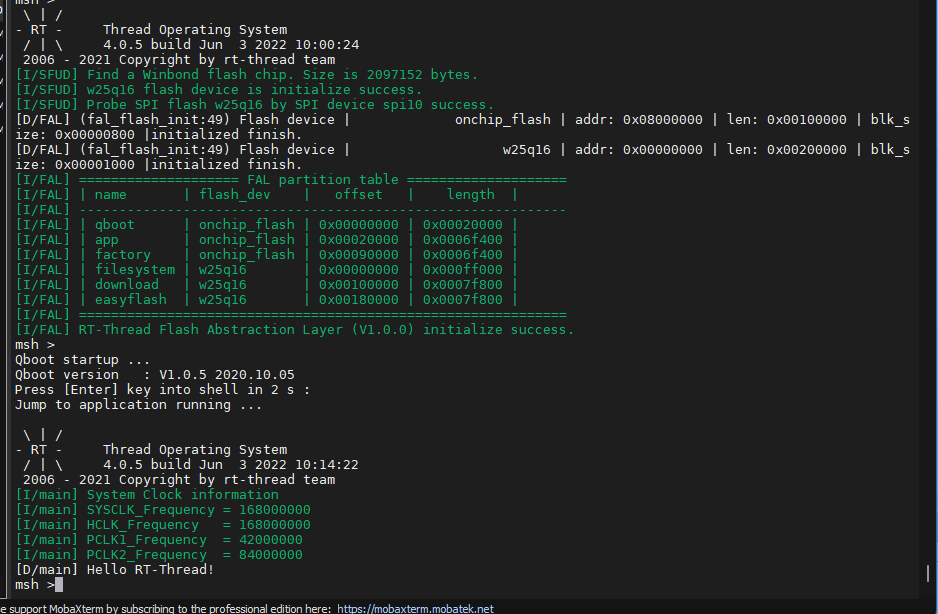 3.1 最基本的app已经成功运行
3.1 最基本的app已经成功运行附带一个工程文件
https://github.com/Letian-stu/Stm32F407-rtos-qboot-app-prj
Stm32F4-spi-qboot-mini
- 对qboot的移植;
- 分区设置;
- 可以使用ymodem_ota;
Stm32F4-spi-usb-at
- 使用esp8266实现连接网络;
- http_ota;
- 使能usb-device对w25q16的filesystem读写;
声明:本文内容及配图由入驻作者撰写或者入驻合作网站授权转载。文章观点仅代表作者本人,不代表电子发烧友网立场。文章及其配图仅供工程师学习之用,如有内容侵权或者其他违规问题,请联系本站处理。
举报投诉
-
GD32F103RCT6移植qboot,烧录之后系统卡死怎么解决?2025-09-19 841
-
RTThread完整版学习之操作系统移植2023-07-26 3103
-
使用rtthread nano移植LED程序的步骤2022-07-11 2976
-
华大单片机移植RTThread操作系统教程及代码2022-06-27 9736
-
rtthread的学习笔记分享2022-03-15 1758
-
RTthread移植代码自动生成方案2022-02-11 825
-
【rtthread学习笔记系列】第二篇:中断2022-01-25 615
-
rtthread套娃移植2021-12-20 1025
-
【STM32F767】使用RTThread和TouchGFX实现DIY数字仪表(一)——使用STM32CUBMX5.6移植touchGFX4.132021-12-05 946
-
华大单片机移植RTThread操作系统2021-11-17 1182
-
怎样去移植基于RTThread的操作系统?2021-10-08 1572
-
将ucosii移植到stm32F107的学习笔记2021-08-23 1034
-
RTThread之操作系统移植2021-08-03 1662
全部0条评论

快来发表一下你的评论吧 !

